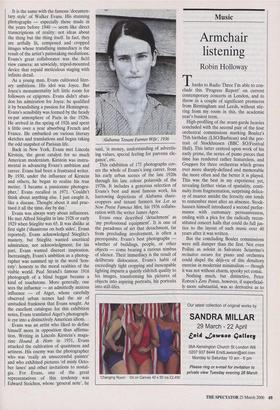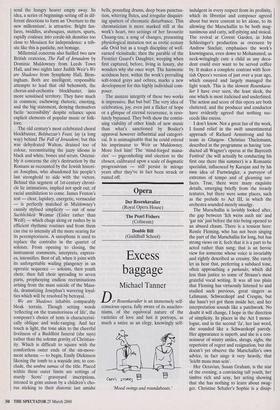Music
Armchair listening
Robin Holloway
Thanks to Radio Three I'm able to con- clude this 'Progress Report' on current contemporary concerts in London, and to throw in a couple of significant premieres from Birmingham and Leeds, without stir- ring from my room in this, the academic year's busiest term.
High-profiling of the avant-garde heavies concluded with the second pair of the four orchestral commissions marking Boulez's 75th birthday (LSO/Barbican) and the por- trait of Stockhausen (BBC SO/Festival Hall). This latter centred upon work of his early prime, the series of piano pieces that time has rendered rather featureless, and Gruppen for three orchestras which grows ever more sharply-defined and memorable the more often and the better it is played. This was the best in my experience yet, revealing further vistas of spatiality, conti- nuity from fragmentation, surprising delica- cy of nuance amidst the ferocity one tends to remember most after an absence. Stock- hausen himself introduced a second perfor- mance with customary persuasiveness, ending with a plea for the radically recon- stituted concert halls that could do full jus- tice to the layout of such music over 40 years after it was written.
But the concluding Boulez commissions were still damper than the first. Not even Pollini as soloist in Salvatore Sciarrino's recitativo oscuro for piano and orchestra could dispel the ddja-vu of this desultory exercise in modernist minimalism — though it was not without charm, spooky yet comic.
Nothing much, but distinctive, Peter Eotvos's Zero Points, however, if superficial- ly more substantial, was so derivative as to send the hungry hearer empty away. Its idea, a series of beginnings setting off in dif- ferent directions to form an 'Overture to the new millennium', is attractive. Bright fan- fares, twiddles, arabesques, stutters, spurts, rapidly coalesce into corale-ish densities too close to Messiaen for independence: a trib- ute like this is pastiche, not homage.
Millennial concerns also fuelled two new British oratorios, The Fall of Jerusalem by Dominic Muldowney from Leeds Town Hall, and two nights later Judith Weir's We are Shadows from Symphony Hall, Birm- ingham. Both are intelligent, responsible attempts to lead that old behemoth, the chorus-and-orchestra blockbuster, into more sensitised territory. They have much in common, eschewing rhetoric, emoting, and the big statement, denying themselves facile 'accessibility' despite reliance upon explicit elements of popular music or folk- lore.
The old century's most celebrated choral blockbuster, Belshazzar's Feast, lay (a long way) behind The Fall of Jerusalem; but this was dehydrated Walton, drained too of colour, reconstituting the jazzy idioms in black and white, bones and scruts. Ostensi- bly it concerns the city's destruction by the Romans as recounted by the Jewish histori- an Josephus, who abandoned his people's last stronghold to side with the victors. Behind this segment of 1st-century chroni- cle lie intimations, implied not spelt out, of racial annihilation to come. James Fenton's text — clear, lapidary, energetic, vernacular — is perfectly matched in Muldowney's cannily stylised simplicity — out of neue Sachlichkeit Weimar (Eisler rather than Weill) — which chugs along or rushes by in efficient rhythmic routines and from them can rise to intensity all the more searing for its peremptoriness. A saxophone is used to replace the contralto in the quartet of soloists. From opening to closing, the instrument comments, interprets, express- es, intensifies. Best of all, when it joins with its unforgettable wailing plangency in an operatic sequence — soloists, then youth choir, then full choir spreading to seven parts, prophesying endless recriminations arising from the mass suicide of the Masa- da, dramatizing Josephus's wavering loyal- ties which will be resolved by betrayal.
We are Shadows inhabits comparably bleak terrain. Though setting words 'reflecting on the transitoriness of life', the composer's choice of texts is characteristi- cally oblique and wide-ranging. And her touch is light, the tone akin to the cheerful liveliness of a Buddhist funeral (she says) rather than the solemn gravity of Christian- ity. Which is difficult to square with the comfortless outer ends of the six-move- ment scheme — to begin, Emily Dickinson likening the tomb to a wayside inn; to con- clude, the umbra sumus of the title. Placed within these outer limits are settings of sturdy Scots' graveyard inscriptions, intoned in grim unison by a children's cho- rus sticking to their diatonic last amidst bells, pounding drums, deep brass punctua- tion, whirring flutes, and irregular disquiet- ing spatters of chromatic disturbance. This chromaticism is more marked still at the work's heart, two settings of her favourite Chuang-tzu; a song of changes, presenting physiological mutation not as erotic ecstasy alla Ovid but as a tough discipline of well- earned vicissitude; then the parable of the Frontier Guard's Daughter, weeping when first captured, before, living in luxury, she wonders why she once wept. The harmonic acridness here, within the work's prevailing soft-toned greys and ochres, marks a new development for this highly individual com- poser.
The austere integrity of these two works is impressive. But but but! The very idea of celebration, joy, even just a flicker of hope or a glimpse of eternal recurrence, is reso- lutely bypassed. They both show the contin- uing viability of other kinds of new music than what's sanctioned by Boulez's approval however influential and categori- cal. It is unimaginable that he could extend his imprimatur to Weir or Muldowney. More fool him! The 'mind-forged mana- cles' — pigeonholing and election to the chosen, calibrated upon a scale of dogmatic progressivism — still persist in mirage years after they've in fact been struck or rusted off.



































































 Previous page
Previous page